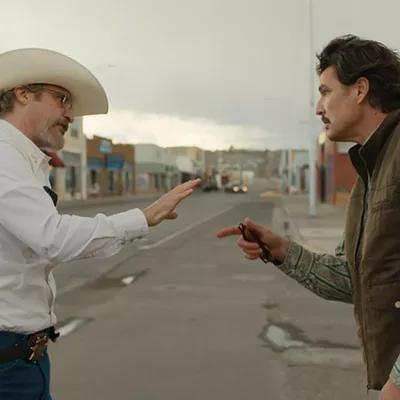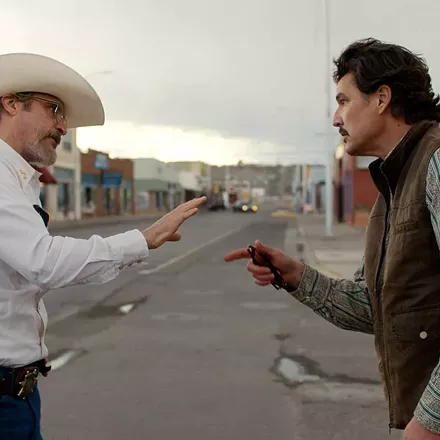Love: the foremost four-letter word. Or at least it is in Mike Nichols' glossy yet stormy adaptation of Patrick Marber's 1997 world-weary hit play, Closer, which collates the most intense moments in the romantic lives of a quartet of modern-day men and women who meet, part, obsess, fixate, avenge and take revenge.
The story covers the most emotional moments of meeting and parting in the lives of four Londoners: self-pitying obits writer Jude Law, photographer Julia Roberts, brash dermatologist Clive Owen and still-formative life force Natalie Portman. The dialogue is blunt and the emotions even more so, capturing all the things you've thought and felt but never put into precise and profane language at the moment you're most wounded: That's the black heart of the scarring, scarily funny events these actors enact with eager intimacy.
Nichols, 73 -- who's been here before with movies like Carnal Knowledge (1970) and Who's Afraid of Virginia Woolf? (1966) -- has said he believes civilization begins and ends at a man and woman's breakfast table.
"Anything worth fighting for is worth fighting dirty for" is one of the many epigrams he repeats about the stories he's attracted to. And why do actors trust him? "I love to take them to a place where they open a vein. That's the job. The key is that I make it safe for them to open the vein."
And why do writers like Tony Kushner (Angels in America) and Marber, 40, trust Nichols? Marber, who wrote and directed the original London stage production, wanted to direct the movie because he was unwilling to let his play fall into Hollywood's studio development hell. So why Nichols? "Well, he made Carnal Knowledge and made Who's Afraid of Virginia Woolf."
And? "And he's just very charming and hilarious and smart. At the first meeting we had, at his apartment, we had breakfast together, and he was just someone I knew would be fantastic to spend a couple of years with working on something. He had a passion for the material. He didn't talk about it in some high-falutin', intellectual way. He just said, 'I know who these people are, I've lived it, I've been there.' He had no moral problems with it. He had no worries about likeability or all the things that are problematic in the material. He just cared for it instantly and passionately."
And he simply wanted to be involved in its filming. "He was quite happy to produce it if I wanted to direct," Marber continues. "But obviously, I was sitting in a room with Mike Nichols. I'm not gonna say, 'Yeah, I want to direct it and you can produce.' I wanted him, the full experience. I also knew he came from the theater, he was respectful of the material, he wanted me around. That was part of his -- how to put it? -- not his pitch ... part of his conversation was, 'Look, the way I work, I have the writer in the rehearsal room, I have the writer on set. We work on the screenplay together.' He was absolutely true to his word. We're still collaborating as we do screening [introductions] and Q and As. We're a double act!"
In fact, Marber and Nichols both come from comedy backgrounds. "Mike and I were doing a Q and A last night and a question was asked about that. I said that the difference between Mike and me is that Mike, in his twenties, was rich, famous and successful, and I was poor, desperate and unknown. Other than that? We had exactly the same background."
In spite of a few choice lines and a lot of sexual tension, Closer exhibits a good deal of reserve. "It's very important to me that there's no nudity in the play. It's all about words, and the words we use. I wanted the audience to always feel like they'd seen all this sex, but they hadn't seen a damn thing."
But around the world, a percentage of critics invariably see Closer as something misanthropic and cynical. "I'm really used to that as a criticism of the material," Marber says, shrugging. "People who didn't go with the play would say it's cynical and misanthropic. Mike has inherited that criticism. Of course, I don't think I'm misanthropic, I don't think I'm cynical, I don't think the material is. I think it's true, I think it's dark, I think it's how it is. Some people aren't going to like that, and they're just going to say, 'That's not how it is at all.' I see films that are very well reviewed, they're underscored with violins, they're directing you how to feel, and Mike Nichols doesn't do any of that shit. And I love him for that. He just presents it and just goes, 'How do you feel about this?'
"I love the integrity and the courage of that," Marber continues. "I think it's about love and I think it's about how people behave in the grip of terrible passion."















